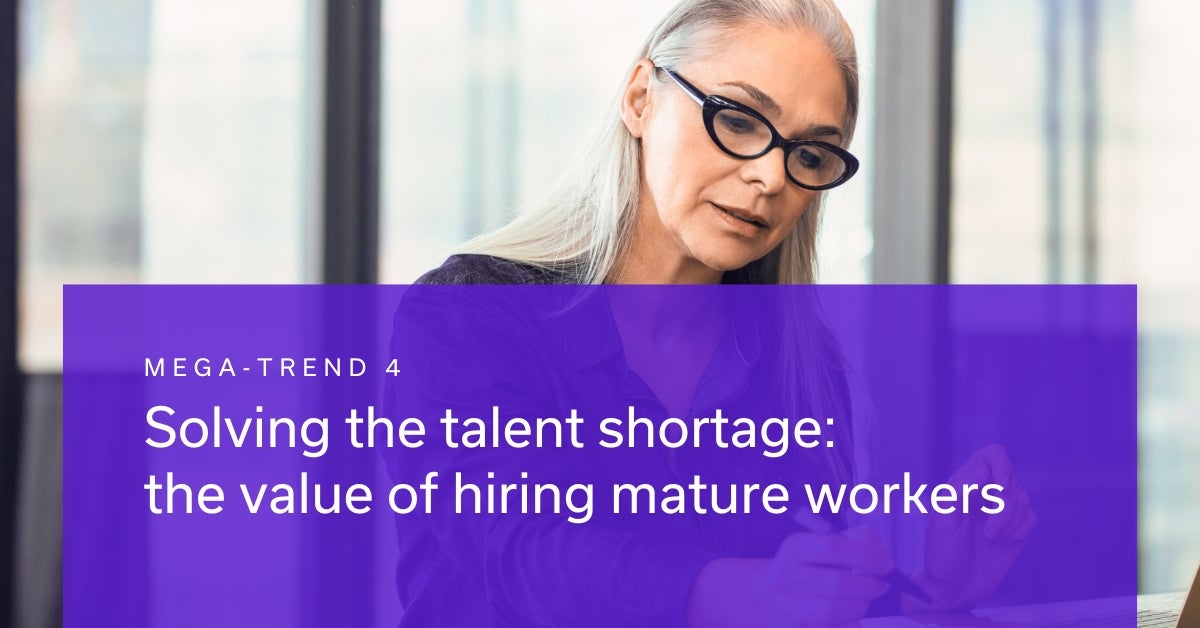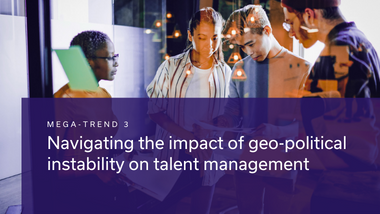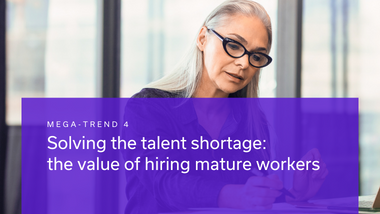Solving the talent shortage: the value of hiring mature workers
As swathes of workers aged 50 plus retire, workforce demographics are set for a seismic change, and this is not limited to one country. The ramifications of Baby Boomers and Generation X stepping away from traditional employment are being felt across the world. It’s imperative that companies begin to re-evaluate their attitudes towards mature workers or risk missing out on a valuable source of talent.
The world’s population is ageing and soon we will see the largest ever generation retiring, taking with them their knowledge, experience, and capital. According to the CIPD, in the next ten years the 65 plus age group will swell by 2.7 million in the UK while the population aged 50 to 64 will remain static. However, this is not a new trend. Let’s turn to Australia where in the 20 years leading up to April 2021, the workforce participation rate of mature Australians more than doubled (from 6.1% in 2001 to 15% in 2021) due to the ageing population. Japan has also effectively extended their workforce by including mature workers. A 2021 white paper from Japan’s Cabinet Office shows that one in three Japanese aged 70 to 74 are still in employment, evidencing a ten-point increase from ten years ago.
Businesses will face challenges as they look to fill significant talent shortages within a greatly reduced labour market. While recent attempts by government to mitigate this shift have been met with opposition, such as French President Macron’s proposal to raise the retirement age by two years, there are many people who do wish to continue working beyond the traditional retirement age. Furthermore, deteriorating economic conditions over the next few years will scupper retirement plans for many, and curtail dreams of early retirement for Generation X.
Governments, businesses, and society as a whole will need to reassess how they view ageing, employment and talent. Whether the bias is conscious or not, many employers still discriminate against candidates based on age. In October 2022, the Chartered Management Institute (CMI) surveyed more than 1,000 managers working in UK businesses and public services. They found that just four out of ten (42%) were open “to a large extent” to hiring people aged between 50 and 64. Conversely, 74% of managers were open “to a large extent” to hiring younger workers between the ages of 18 and 34. So, while age discrimination can apply to younger candidates, older applicants face greater challenges.
So, are we witnessing the rise of the Third Age? The Chancellor of the Exchequer, the Rt Hon Jeremey Hunt appears to take this view, having recently called for early retirees to re-enter the workforce to help tackle labour shortages. Businesses will need to make changes to their resourcing and recruitment processes to accommodate and access the talent and years of experience of mature candidates. This might, for instance, include offering flexible or remote working benefits to assist older employees who would previously not have returned to work due to the commute or other commitments. Hiring managers will need to diversify their offerings and put in place fresh policies to reduce the risk of discrimination and attract potential employees from all sections of society.
The changing demographics of a workforce create opportunity for business. Currently, there is a real need for many employers to value, invest in, and plan for the role of mature employees. If employers make the most of their existing Third Age staff, they will feel the positive impact on their business.
To find out how you can prepare for and thrive in this changing climate, download our report which explores the five mega-trends impacting talent and skills in 2023 and beyond. In this guide, Phill Brown, our Practice Director – Data Analytics & Insights, will offer predictions for the future, as well as actions that businesses can take to adapt to each mega-trend and operate effectively in the new world of work.













